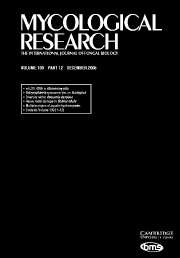Article contents
Screening for tolerance to bavistin, a benzimidazole fungicide containing methyl benzimidazol-2-yl carbamate (MBC), in Beauveria bassiana: Sequence analysis of the β-tubulin gene to identify mutations conferring tolerance
Published online by Cambridge University Press: 13 May 2003
Abstract
The entomopathogenic Beauveria bassiana is a potential biopesticide. Fungicide-tolerant isolates of this fungus would have an added advantage of being compatible with the conventional chemical methods of pest control. Therefore, 30 isolates of the fungus were screened for tolerance to bavistin a commonly used benzimidazole fungicide containing methyl benzimidazol-2-yl carbamate (MBC). Germination and growth bioassays in the presence of 0.05% bavistin were conducted for screening. Three tolerant isolates were identified, showing tolerance up to 2% bavistin. Mutation in the β-tubulin gene is known to confer tolerance to MBC; the nine known mutation sites in the gene involved were sequenced in the tolerant strains. The β-tubulin gene from codons 1–405 was amplified using two pairs of degenerate primers, designed for the conserved region of the β-tubulin gene and sequenced. From the sequence suitable primers were designed for the regions flanking the nine known sites involved in mutations conferring MBC tolerance. The amplified products with these primers from the MBC-tolerant isolates were sequenced and in two (ARSEF 1315 and ARSEF 1316) a mutation was detected in the 198 codon resulting in replacement of glutamic acid with lysine. In the third tolerant isolate (ITCC 913) no mutation could be detected in any of the nine known sites conferring tolerance to MBC. To complete the sequencing of the β-tubulin gene, the remaining part (from codon 405 onwards) of the gene was isolated by a three-prime gene walk. The gene sequence showed a close homology to fungal β-tubulin genes with four introns.
- Type
- Research Article
- Information
- Copyright
- © The British Mycological Society 2003
- 13
- Cited by


